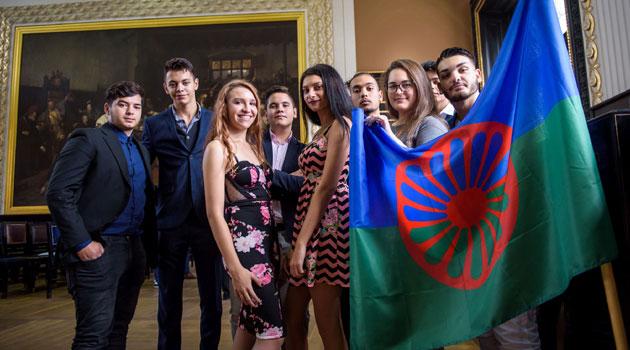ROMEA gives 94 Romani students at Czech colleges and high schools scholarships, program is in its fifth year
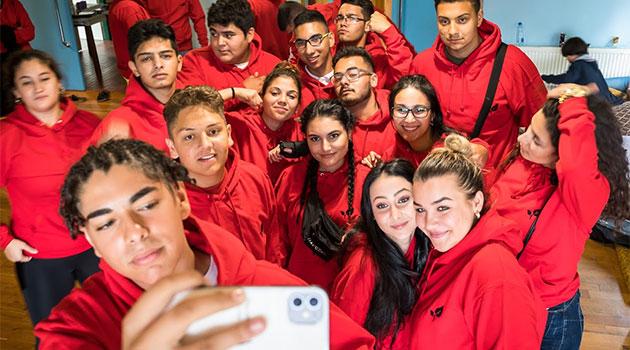
At the close of October and beginning of November the ROMEA organization disbursed 94 scholarships to Romani students attending Czech higher vocational schools, high schools, and for the first time, universities. The students are in diverse fields of study all over the Czech Republic and do well academically, but their socioeconomic situations are such that they risk being unable to complete secondary school or university – or even to begin such study.
The first half of the scholarship has just been sent to the 94 new beneficiaries. They will receive the second half after submitting their mid-semester report cards or transcripts in March 2021.
ROMEA’S ROMANI SCHOLARSHIP PROGRAM IN NUMBERS
- since 2016 a total of 365 scholarships for 213 students
- For the year 2020/21: we supported 53 high school students, nine higher vocational students, 32 university students
Scholarships awarded by year
- 2016/2017: CZK 875 000
- 2017/2018: CZK 1 211 000
- 2018/2019: CZK 868 000
- 2019/2020: CZK 1 043 000
- 2020/2021: CZK 1 731 000
TOTAL: CZK 5 728 000 [EUR 218 300]
This program for students was launched by ROMEA in 2016 and has awarded a total of 365 scholarships to 213 Romani students so far. Several beneficiaries have been awarded the scholarship repeatedly for their academic achievements and active involvement in the program.
The annual scholarship amounts are CZK 14 000 [EUR 535] for high school students, CZK 21 000 [EUR 800] for higher vocational students and CZK 25 000 [EUR 950] for university students, which means ROMEA disburses scholarships during each academic year to the tune of CZK 1 731 000 [EUR 66 000]. The funding for the scholarships is provided by private foundations such as the Albatros Foundation of the Czech Republic and the VELUX Foundation of Denmark, as well as through aid donated by individuals.
“This year ROMEA is implementing the fifth year of this scholarship program, which is a brilliant opportunity to take stock and look back at everything we have experienced with the students. In August we held our 11th student meeting, BARUVAS, which in Romanes means ‘We are growing’. We actually see a great deal of symbolism in that name today, because not only is the number of Romani people who are becoming students growing, but the students themselves are also growing personally and professionally,” explained scholarship program manager Jitka Votavová.
The scholarship program is not just about financial aid during one’s studies. The regular BARUVAS meetings are a component of the program, as are mentoring and tutoring services.
The students also take full advantage of the opportunity to attend educational courses above and beyond their school duties, to participate in the annual literary competition, to do volunteer work with different local aid organizations, to tutor their fellow pupils, and to train younger children in football or judo. “During the year we are intensively in contact with the students and they are likewise in contact with each other. Thanks to social media, they stay in touch no matter where they live and take an interest in each other. They encourage each other if one of them has an important exam coming up, or they help each other find materials for school, etc.,” Votavová described.
PHOTO GALLERY
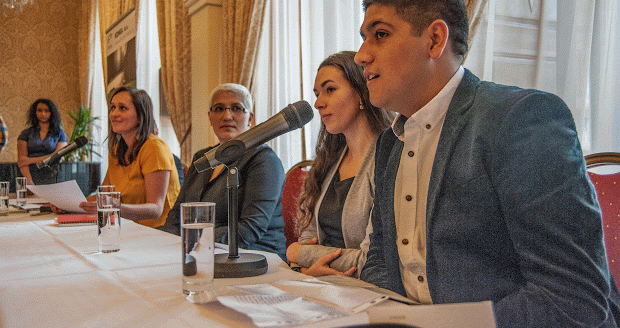
“I realized who I am”
It turns out that while the initial motivation for students to join the scholarship program is the financial aid they receive during their studies, the other components of the program gradually become more important to them. This is most true of the regular BARUVAS meetings where several dozen Romani college and high school students from all over the Czech Republic come together.
Thanks to experiential workshops, those attending BARUVAS learn a great deal of information about Romani history and literature, content that is rarely taught in the Czech schools, and they speak about their Romani identity and what it means to them, sharing what are frequently very sensitive experiences from their own studies, from their lives in excluded localities, and their experiences with the discrimination and racism they encounter when, for example, their families are looking for housing, their parents are looking for jobs, or when they themselves seek part-time work while they study. During BARUVAS the students also familiarize themselve with the stories of eminent figures in the Romani community who become inspiring for them and thanks to whom they acquire faith in their own abilities.
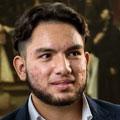 Keresztély Szinai, senior student, Economic Lyceum, Ústí nad Labem:
Keresztély Szinai, senior student, Economic Lyceum, Ústí nad Labem:
“Thanks to the scholarship program I got the chance to learn more about Romani history and identity. Thanks to this opportunity I realized who I am, basically. That means much more to me than all the money we receive.”
Most of the instructors during BARUVAS are also Romani men and women who convey their own experiences and knowledge of different professions to the students – we have long collaborated, for example, with the poet and Romani Studies scholar Renata Berkyová; with Romani Studies scholar Michal Mižigár; with the journalists Patrik Banga and Richard Samko; with the fashion designer who is also conquering the culinary world, Pavel Berky; with the experienced artist, instructor and LGBT activist David Tišer; with the painter Laďa Gažiová; with the psychologist Monika Mihaličková; with authors Dana Hrušková and Iveta Kokyová; with the musician Jan Dužda and many others. “During the group gatherings, the students find the motivation to keep studying and the need to share the information they have acquired with others – for that reason, two years ago, a group of these students came up with the brilliant idea of holding a talk for Romani children attending primary school in one of the excluded localities of the Ústecký Region where they speak with them about what studying can bring them, about how they can believe in themselves despite their difficult living conditions, and about the fact that support programs do exist that can aid them with the transition from primary to secondary school and further during their studies,” Votavová explains.
 Michal Gábor, third-year student in the Bachelor’s program at Ostrava University, Department of Physical Geography and Geo-ecology:
Michal Gábor, third-year student in the Bachelor’s program at Ostrava University, Department of Physical Geography and Geo-ecology:
“What do I remember from that first meeting? How grateful I am for it. Why? Because I got to know so many amazing people, some of whom are my friends to this day, and we are in almost daily contact. BARUVAS brought a lot of happiness to my life. For that reason I am really sorry that I can’t see you all right now. I miss you all and I am thinking of you. How did it influence my studies? Right now I’m writing my Bachelor’s thesis.”
With financial support from Bader Philanthropies and based on the Romani students’ own initiative, a project has been developed during which they visit primary schools attended by large numbers of Romani pupils and do their best to convey to them what they themselves have learned during BARUVAS and thanks to the ROMEA organization’s scholarship program. “Because the schools have been closed, we have only managed to hold four talks so far, but even so the project is having an enormous impact. Four pupils at the Chanov Primary School this year were accepted into secondary school and they say it was meeting with our students during the talk that ultimately encouraged them to apply. Two of the Chanov pupils are even now scholarship recipients in our program. I believe that once the situation with the novel coronavirus calms down, we will be able to go into the field again to motivate young pupils to study,” said Štefan Balog, coordinator of the educational activities and fundraiser at ROMEA.
PHOTO GALLERY
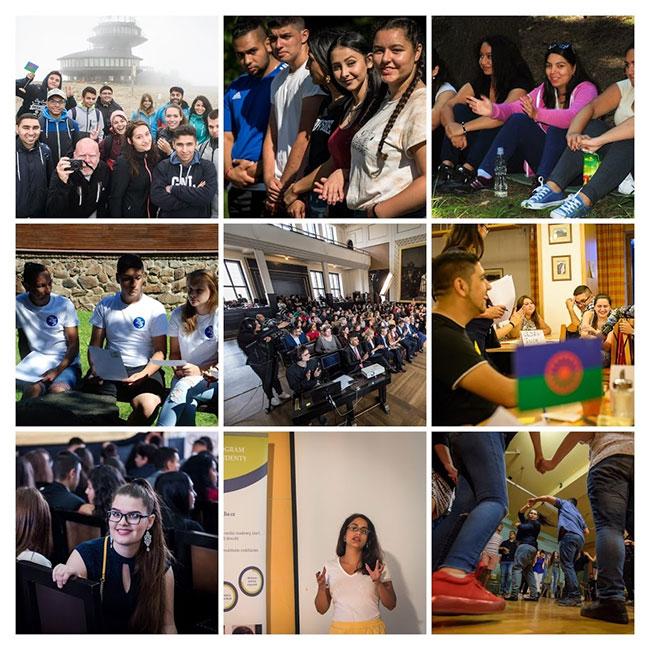
Individual donors? Impossible without them
The scholarship program could not exist without the support of private foundations. The main donors to the program are the Albatros foundation in the Czech Republic, Bader Philanthropies of Milwaukee, Wisconsin in the USA, and the VELUX Foundation of Denmark.
However, significant aid is also contributed by many individual donors, a substantial portion of whom are themselves Romani. These individual donors contribute through the online campaigns implemented annually by ROMEA, and while they may contribute smaller amounts of money, we appreciate their long-term support even more.
Thanks to regular giving, it is possible to better plan the activities of the program for the years to come. Thanks to the aid of individual donors, it was also possible to respond to the situation this year whereby primary school pupils and students had no computers or Internet access through which to access distance learning during the pandemic.
“Through social media and an online campaign we disseminated a challenge to support students from disposessed families who cannot, because of their low incoomes, afford to buy a new computer, or who could only do so at the cost of endangering their ability to pay rent for one month. People began sending us their laptops, desktop computers, printers and tablets, which we then sent to students from impoverished families from all possible regions. As of today we have managed to choose and distribute more than 80 units of technology worth more than half a million crowns. One of our long-term supporters donated enough money to purchase 18 new laptops. We greatly appreciate this,” Balog said.
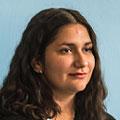 Vanesa Harvanová, student in the third year of travel and tourism studies:
Vanesa Harvanová, student in the third year of travel and tourism studies:
“I never believed that there were other Roma like me who actually wanted to get an education. Previously, I thought I was the only one, and to express something like my Romani identity at all in a school full of non-Roma would never have occurred to me. Ever since then I have recognized that I have nothing to be ashamed of – on the contrary, I should be proud! Each meeting motivates me more and more, and I know there are people here who believe in me.”
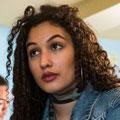 Michaela Makulová, student in the third year of secondary school for preschool and pedagogy:
Michaela Makulová, student in the third year of secondary school for preschool and pedagogy:
“When I first came to BARUVAS it was like a different world, everybody liked each other and helped each other out even though they barely knew each other – there was not a single thing that was wrong with it. I got to know many good friends who have become my family, and I already cannot imagine life without them, and I’ve gotten a lot out of this. I don’t know how to fully describe what this means to me. Each time it is an indescribable experience to which I really look forward and I hope we will all meet again soon.”
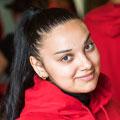 Barbora Vašková, senior student in social work:
Barbora Vašková, senior student in social work:
“The BARUVAS meeting has changed my life and my future, thanks to this meeting I have begun to believe in myself more, to believe that I, too, can achieve something, and that I have the right to my own dreams and opinions. I have gained awareness, experiences and friends, and I am incredibly glad about that. Each meeting has given me more and more certainty about being able to deal with each year of school, that I will handle making it to graduation, although now that we’re not meeting and can’t see each other, I sometimes still can’t believe I’ll manage.”
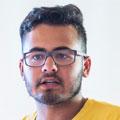 Štefan Feri, student in the third year of secondary school for for practical nursing:
Štefan Feri, student in the third year of secondary school for for practical nursing:
“For me, the BARUVAS meeting of Romani students means a great deal. It is proof to me, and to society, that there are Romani people here who study and want to achieve something. I was glad to learn that there are so many of us, that we have similar opinions, similar dreams, and that we want to achieve something. This year I was terribly bothered by the fact that there were not more BARUVAS meetings because of coronavirus. I hope there will be another one as soon as possible. I really like those people an awful lot, they are part of my family! I will be glad if there will be more meetings and I will get to know many other Romani people who believe that study is a part of life.”
